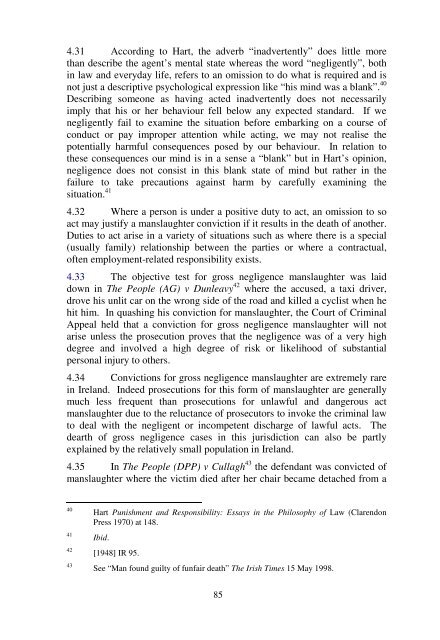murder and involuntary manslaughter - Law Reform Commission
murder and involuntary manslaughter - Law Reform Commission
murder and involuntary manslaughter - Law Reform Commission
You also want an ePaper? Increase the reach of your titles
YUMPU automatically turns print PDFs into web optimized ePapers that Google loves.
4.31 According to Hart, the adverb “inadvertently” does little morethan describe the agent’s mental state whereas the word “negligently”, bothin law <strong>and</strong> everyday life, refers to an omission to do what is required <strong>and</strong> isnot just a descriptive psychological expression like “his mind was a blank”. 40Describing someone as having acted inadvertently does not necessarilyimply that his or her behaviour fell below any expected st<strong>and</strong>ard. If wenegligently fail to examine the situation before embarking on a course ofconduct or pay improper attention while acting, we may not realise thepotentially harmful consequences posed by our behaviour. In relation tothese consequences our mind is in a sense a “blank” but in Hart’s opinion,negligence does not consist in this blank state of mind but rather in thefailure to take precautions against harm by carefully examining thesituation. 414.32 Where a person is under a positive duty to act, an omission to soact may justify a <strong>manslaughter</strong> conviction if it results in the death of another.Duties to act arise in a variety of situations such as where there is a special(usually family) relationship between the parties or where a contractual,often employment-related responsibility exists.4.33 The objective test for gross negligence <strong>manslaughter</strong> was laiddown in The People (AG) v Dunleavy 42 where the accused, a taxi driver,drove his unlit car on the wrong side of the road <strong>and</strong> killed a cyclist when hehit him. In quashing his conviction for <strong>manslaughter</strong>, the Court of CriminalAppeal held that a conviction for gross negligence <strong>manslaughter</strong> will notarise unless the prosecution proves that the negligence was of a very highdegree <strong>and</strong> involved a high degree of risk or likelihood of substantialpersonal injury to others.4.34 Convictions for gross negligence <strong>manslaughter</strong> are extremely rarein Irel<strong>and</strong>. Indeed prosecutions for this form of <strong>manslaughter</strong> are generallymuch less frequent than prosecutions for unlawful <strong>and</strong> dangerous act<strong>manslaughter</strong> due to the reluctance of prosecutors to invoke the criminal lawto deal with the negligent or incompetent discharge of lawful acts. Thedearth of gross negligence cases in this jurisdiction can also be partlyexplained by the relatively small population in Irel<strong>and</strong>.4.35 In The People (DPP) v Cullagh 43 the defendant was convicted of<strong>manslaughter</strong> where the victim died after her chair became detached from a40414243Hart Punishment <strong>and</strong> Responsibility: Essays in the Philosophy of <strong>Law</strong> (ClarendonPress 1970) at 148.Ibid.[1948] IR 95.See “Man found guilty of funfair death” The Irish Times 15 May 1998.85
















